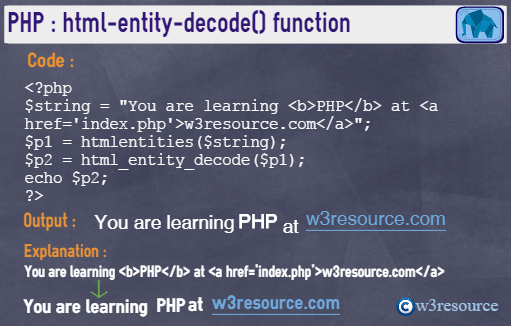PHP : html_entity_decode() function
PHP: Convert HTML entities to their corresponding characters
The html_entity_decode() function is used to convert all HTML entities to their applicable characters.
Version
(PHP 4 and above)
Syntax
html_entity_decode(input_string, quote_style, charset )
| Name | Description | Required / Optional |
Type |
|---|---|---|---|
| input_string | The string to be converted. | Required | String |
| quote_style | Encoding single and double quote. ENT_COMPAT : Convert double quotes and leave single quotes unchanged. ENT_COMPAT is the default setting ENT_QUOTES : Converts both single and double quotes. ENT_NOQUOTES: Converts neither single nor double quotes. |
Optional | Integer |
| charset | Refers the character set to be used. List of character set. ISO-8859-1 : Western European, Latin-1 [default character set]. ISO-8859-15 : Western European, Latin-9. UTF-8 : ASCII compatible multi-byte 8-bit Unicode. cp866 : DOS-specific Cyrillic charset. cp1251 : Windows-specific Cyrillic charset. cp1252 : Windows-specific charset for Western European. KOI8-R : Russian. BIG5 : Traditional Chinese. GB2312 : Simplified Chinese. BIG5-HKSCS : Big5 with Hong Kong extensions. Shift_JIS : Japanese. EUC-JP : Japanese. |
Optional | String |
Return values:
The decoded string.
Value Type: String.
Pictorial Presentation

Example:
<?php
$string = "You are learning <b>PHP</b> at <a href='index.php'>w3resource.com</a>";
$p1 = htmlentities($string);
$p2 = html_entity_decode($p1);
echo $p1.'<br/>';
echo $p2;
?>
Output:
You are learning <b>PHP</b> at <a href='index.php'>w3resource.com</a> You are learning PHP at w3resource.com
View the example in the browser
See also
Previous: hebrev
Next: htmlentities
